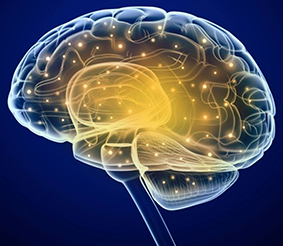Some of the most exciting research in the field of brain chemistry concerns a recently discovered family of chemicals called neuropeptides. These chemicals are found throughout the body, as well as in the brain, sometimes traveling across synapses between neurons (like neurotransmitters) and sometimes traveling through the bloodstream (like hormones). Although these chemicals are found in only minute quantities, they have major effects on experience and behavior. In particular, the endorphins are similar chemically to the painkiller morphine and have the same ability to reduce pain. It has been speculated that the “runner’s high”—the feeling of euphoria that is sometimes experienced by long-distance runners—may result from the release of these brain neuropeptides.
Some investigators have even suggested that vigorous aerobic exercise, like marathon running, can be “addictive” because the release of these morphine-like chemicals is accompanied by pleasant feelings and higher pain tolerance (Houghten, 1986). The neuropeptides are concentrated not only in the brain’s pain centers but also in emotional centers, such as the amygdala, where they may serve to keep our moods under control.
What Are Neuropeptides
Other neuropeptides have been found to have direct effects on drinking behavior, sexual behavior, and memory at least in laboratory animats. The “neuropeptide revolution,” as some scientists are calling it, has raised hopes that synthetic versions of neuropeptides can be developed as painkillers, as relaxants, and even as enhancers of intellectual skills and memory.
The advances that we have chronicled in this chapter promise to be of great practical value. As psychologists learn more and more about the brain, they will be able to develop new ways of treating and preventing the wide range of brain disorders that afflict so many people. Brain research may also lead to new ways to train people to use their brains more effectively.
Although some of the research in genetics and neuroscience makes use of human subjects, much of this research is necessarily conducted with nonhuman animals. In the past decade, animal rights activists have challenged such research—and in some cases stopped it in its tracks—on the grounds that such research unjustifiably exploits animals. We will examine the animal rights movement and its impact on psychological research in the Current Issue that follows.

